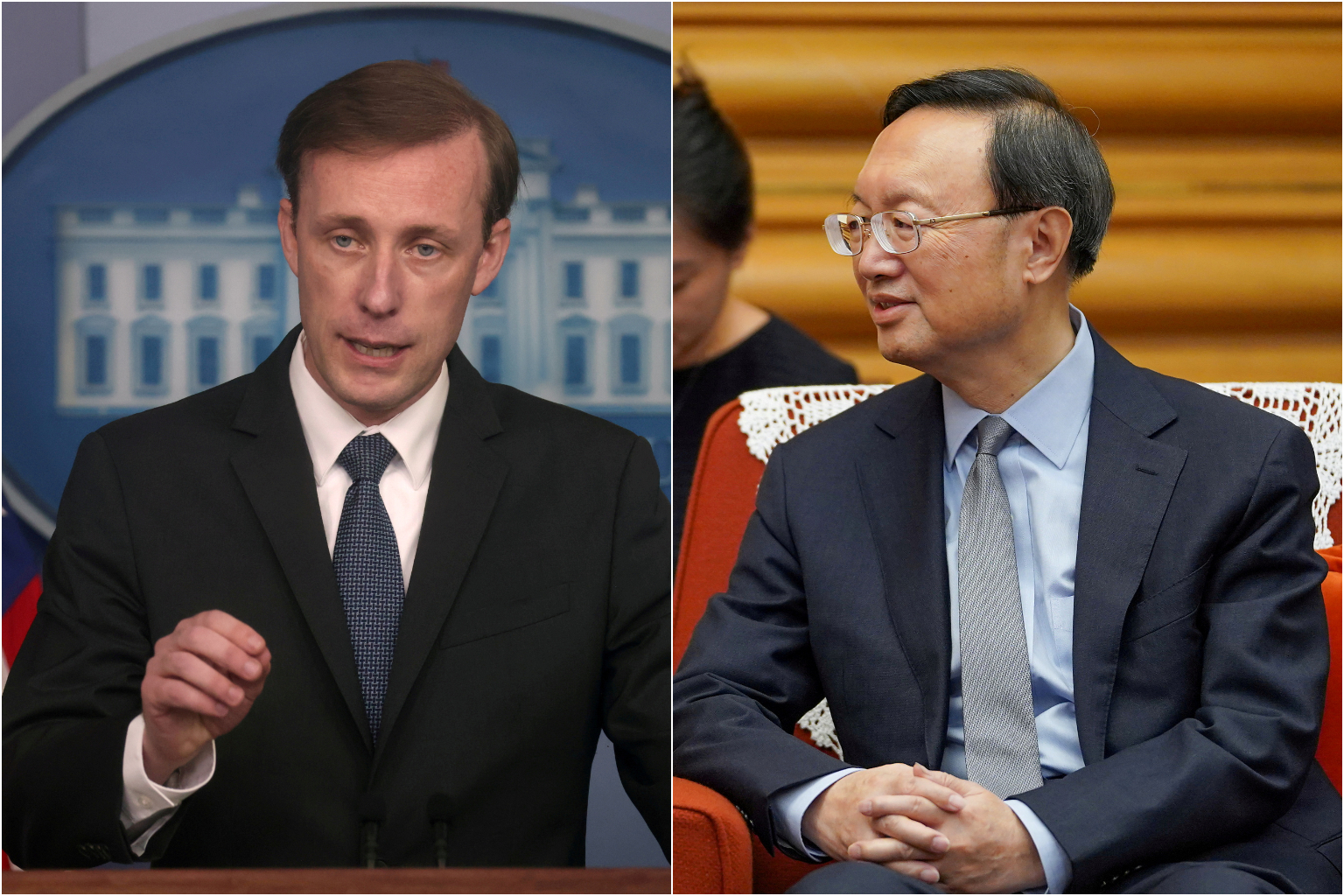US expressed its concerns over China's alignment with Russia in meeting: US official
Sign up now: Get ST's newsletters delivered to your inbox

US national security adviser Jake Sullivan (left) and China's top diplomat Yang Jiechi had a substantial discussion of Russia's war against Ukraine in their meeting on Monday.
PHOTOS: REUTERS
WASHINGTON - The United States is concerned about China's alignment with Russia and has raised these concerns to Beijing, a US official said on Monday (March 14) following a meeting of top American and Chinese officials in Rome.
US National Security Adviser Jake Sullivan and top Chinese diplomat Yang Jiechi had a substantial discussion on Russia's war against Ukraine in their meeting on Monday, the White House said in a statement.
A senior administration official told reporters the meeting was "an intense seven-hour session reflecting the gravity of the moment" and the US commitment to maintaining open lines of communication.
"We do have deep concerns about China’s alignment with Russia at this time, and the National Security Adviser (Mr Jake Sullivan) was direct about those concerns and the potential implications and consequences of certain actions," said the official, who spoke on conditions of anonymity.
The official stressed that the meeting between Mr Sullivan and Mr Yang had been planned for months, since US President Joe Biden and Chinese President Xi Jinping met virtually in November.
She said the meeting was not about negotiating specific issues or outcomes, but about a candid, direct exchange of views and responsibly managing the competition between the two superpowers.
"We believe that it is important to keep open lines of communication between the United States and China, especially in areas where we disagree. And it’s incredibly important to be able to have candid and direct conversations," she added.
The official said that at the meeting, Mr Sullivan "described the unity of the US and its allies and partners, the unprecedented coordination with our European and Nato (North Atlantic Treaty Organisation) allies in particular, as well as the intense and unprecedented engagement by Asia-Pacific allies in bringing costs on Russia for its actions".
The official declined to comment on whether Russia had requested military and economic assistance from China, which both Beijing and Moscow have denied, or whether China had signalled its willingness to do so.
Beijing’s statement after the talks, according to Chinese state media Xinhua, made a single brief mention of the Ukraine issue, focusing largely instead on China-US relations and managing their differences.
"China and the United States should strengthen dialogue and cooperation, properly manage differences and prevent conflict and confrontation," Xinhua quoted Mr Yang as saying.
The two sides also exchanged views on international and regional issues including the Ukraine issue, the Korean Peninsula nuclear issue, the Iran nuclear issue and the Afghanistan issue, Xinhua added.
The meeting came as Washington told its allies that China had responded positively to Russia’s request for military and economic aid in support of its invasion.
The Financial Times (FT), which first reported the request on Sunday, cited officials familiar with American diplomatic cables on the exchange.
According to FT, the US also told allies that Russia requested military equipment from China that included surface-to-air missiles, drones, armoured vehicles, logistics vehicles and intelligence-related equipment.
The US did not share the underlying evidence behind its claims with its allies, the FT reported.
Washington has been increasingly concerned about Chinese support for Russia, and has sought to drive home the consequences that Beijing will face if it throws in its lot with Moscow.
US Commerce Secretary Gina Raimondo last week suggested the option of a trade blacklist, telling The New York Times in an interview that Chinese companies that continue to export to Russia in defiance of sanctions may be blocked from using American equipment and software.
Eurasia Group analysts Neil Thomas, Michael Hirson and Ali Wyne said that whether China fulfils Russia’s request for aid is a "key watchpoint".
Should China agree to provide military hardware or even lethal weapons to Russia, that would amount to Beijing actively taking Moscow’s side in the conflict for the first time, they wrote in a note.
"This development would soon elicit US and EU sanctions and would produce a long-term geopolitical fracture between China and the West, including pressures for more extensive economic decoupling," they said.
However, China is "unlikely to directly assist Russia’s invasion to this degree, as it is attempting to project neutrality in the conflict…and avoid decisive splits with the US and EU".
They added: "Likewise, Beijing is hesitant to risk US retaliation by flagrantly violating Western sanctions and export controls. Nonetheless, Beijing is unlikely to distance itself from Moscow."
But Washington is pessimistic about its odds of dissuading Beijing from backing Moscow, The Guardian reported on Monday, citing another US official.
"They’ve already decided that they’re going to provide economic and financial support, and they underscored that today. The question really is whether they will go further," The Guardian quoted the official as saying.
Should China back Russia, the Biden administration will shift to persuading allies - particularly in Europe - to rethink their relationships with Beijing, The Guardian reported.
Meanwhile, US media reported that Mr Biden may be planning a trip to Europe in the next few weeks.
No final decision has been made yet on such a trip, White House press secretary Jen Psaki said on Monday, but added that the US was closely engaged with its Nato partners and European allies about "the next steps in diplomacy".


